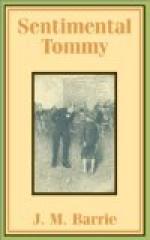“You ain’t got no genius: you has just talent.”
But he had her in bed with the scratches nicely covered up before his mother came home.
He tried another plan with more success. Lost dogs, it may be remembered, had a habit of following Shovel’s father, and he not only took the wanderers in, but taught them how to beg and shake hands and walk on two legs. Tommy had sometimes been present at these agreeable exercises, and being an inventive boy he—But as Elspeth was a nice girl, let it suffice to pause here and add shyly, that in time she could walk.
He also taught her to speak, and if you need to be told with what luscious word he enticed her into language you are sentenced to re-read the first pages of his life.
“Thrums,” he would say persuasively, “Thrums, Thrums. You opens your mouth like this, and shuts it like this, and that’s it.” Yet when he had coaxed her thus for many days, what does she do but break her long silence with the word “Tommy!” The recoil knocked her over.
Soon afterward she brought down a bigger bird. No Londoner can say “Auld licht,” and Tommy had often crowed over Shovel’s “Ol likt.” When the testing of Elspeth could be deferred no longer, he eyed her with the look a hen gives the green egg on which she has been sitting twenty days, but Elspeth triumphed, saying the words modestly even, as if nothing inside her told her she had that day done something which would have baffled Shakespeare, not to speak of most of the gentlemen who sit for Scotch constituencies.
“Reddy couldn’t say it!” Tommy cried exultantly, and from that great hour he had no more fears for Elspeth.
Next the alphabet knocked for admission; and entered first M and P, which had prominence in the only poster visible from the window. Mrs. Sandys had taught Tommy his letters, but he had got into words by studying posters.
Elspeth being able now to make the perilous descent of the stairs, Tommy guided her through the streets (letting go hurriedly if Shovel hove in sight), and here she bagged new letters daily. With Catlings something, which is the best, she got into capital Cs; ys are found easily when you know where to look for them (they hang on behind); Ns are never found singly, but often three at a time; Q is so aristocratic that even Tommy had only heard of it, doubtless it was there, but indistinguishable among the masses like a celebrity in a crowd; on the other hand, big A and little e were so dirt cheap, that these two scholars passed them with something very like a sneer.
The printing-press is either the greatest blessing or the greatest curse of modern times, one sometimes forgets which. Elspeth’s faith in it was absolute, and as it only spoke to her from placards, here was her religion, at the age of four:
“PRAY WITHOUT CEASING.
HAPPY ARE THEY WHO NEEDING KNOW THE
PAINLESS POROUS PLASTER.”




